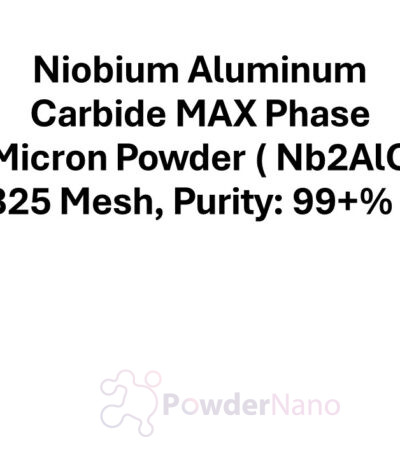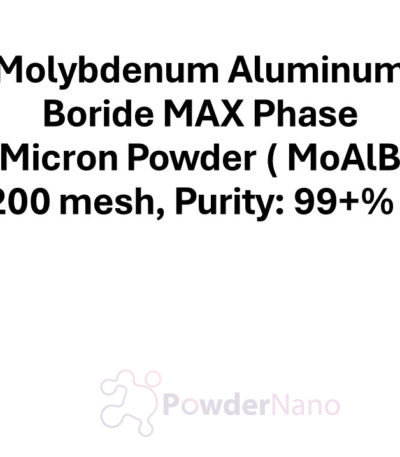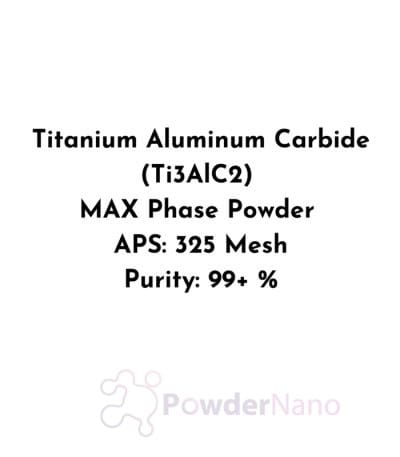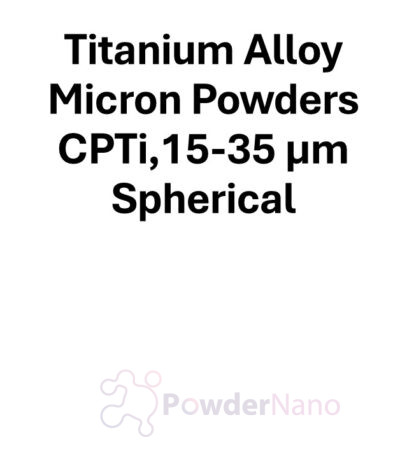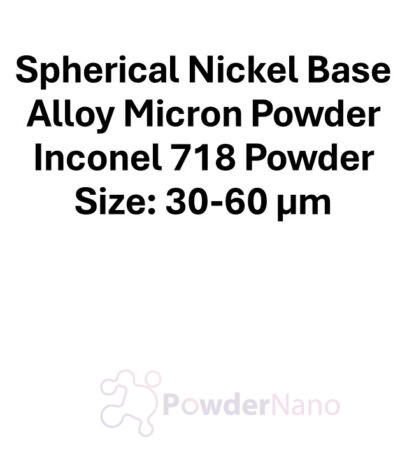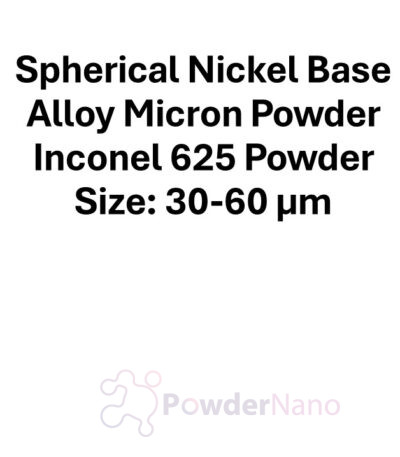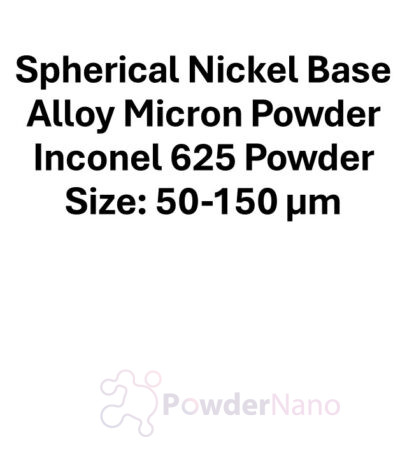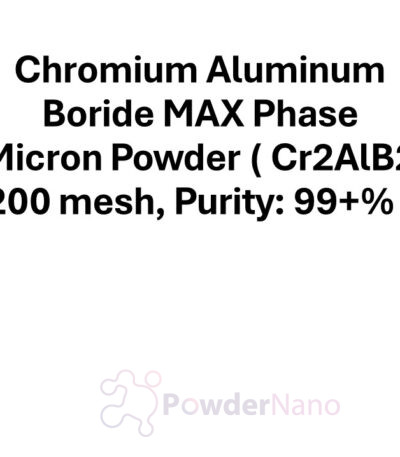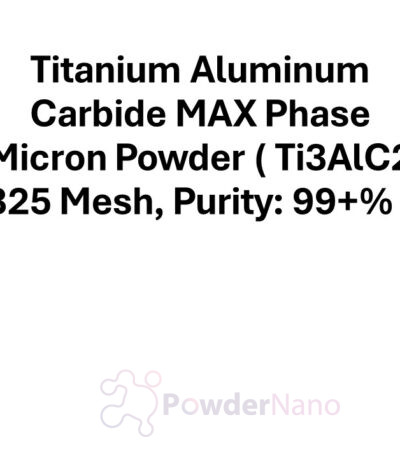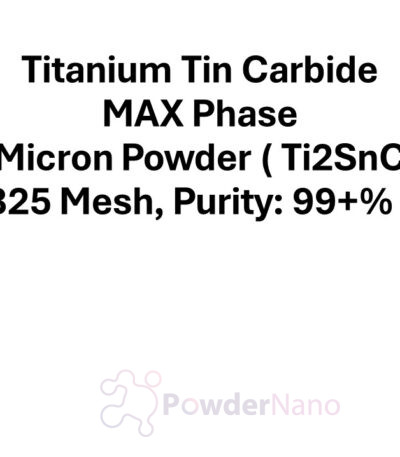Technical Specifications:
- Material: Titanium Tin Carbide (Ti₂SnC)
- Purity: 99% or higher
- Particle Size: 325 Mesh (approximately 44 microns or finer)
- Shape: Typically plate-like or hexagonal crystals, characteristic of the MAX phase structure
- Density: Approximately 4.5 g/cm³
- Melting Point: Approximately 3,100°C (5,612°F)
- Boiling Point: Decomposes before boiling
Chemical Composition:
- Titanium (Ti): ~67%
- Tin (Sn): ~13%
- Carbon (C): ~20%
Applications:
1. High-Performance Ceramics:
- Titanium Tin Carbide (Ti₂SnC) is part of the MAX phase materials, which are known for combining metal-like conductivity with ceramic-like hardness. Ti₂SnC is used in high-performance ceramics for applications requiring exceptional thermal stability, abrasion resistance, and strength.
- It is used in cutting tools, wear-resistant coatings, and engine components exposed to high temperatures and mechanical stress in industries such as aerospace, automotive, and nuclear power.
2. High-Temperature Applications:
- Ti₂SnC demonstrates excellent resistance to thermal shock and oxidation at elevated temperatures, making it ideal for use in high-temperature applications. The MAX phase properties ensure outstanding thermal stability, making it suitable for use in furnace linings, kilns, heat exchangers, and reactor components.
- It is widely used in metallurgy, glass manufacturing, and chemical processing, where components need to withstand extreme heat and thermal cycling.
3. Wear-Resistant Coatings:
- Ti₂SnC is used to create wear-resistant coatings due to its high hardness, strength, and chemical resistance. The 325 mesh particle size is ideal for thermal spraying or plasma spraying to create protective coatings for components like cutting tools, machinery parts, engine components, and valves.
- These coatings improve the service life of parts exposed to abrasion, erosion, and high friction in industries such as mining, oil and gas, and automotive.
4. Electronics and Electrical Conductivity:
- Ti₂SnC exhibits metallic conductivity while maintaining ceramic-like properties. This makes it suitable for electronic applications requiring a balance between conductivity and strength.
- It is being explored in the development of high-performance capacitors, electrodes, and electronic contacts that need high electrical conductivity, thermal stability, and mechanical strength. These properties make it useful in high-power devices, power electronics, and sensors.
5. Structural Materials:
- Titanium Tin Carbide is used as a structural material in demanding applications where strength, thermal stability, and corrosion resistance are crucial. Ti₂SnC is employed in structural components for aerospace, automotive, and military applications, where lightweight yet durable materials are required.
- Its combination of metal and ceramic properties provides it with outstanding performance in environments exposed to high stress, temperature, and harsh chemical conditions.
6. Thermal Management:
- Ti₂SnC’s high thermal conductivity and low coefficient of thermal expansion make it an excellent material for thermal management applications. It is used in heat sinks, thermal interface materials, and radiators to efficiently dissipate heat in electronic devices and power electronics.
- The material’s resistance to oxidation and stability at high temperatures help to ensure optimal thermal regulation in high-performance systems like LEDs, semiconductors, and power converters.
7. Catalysis and Chemical Processes:
- Titanium Tin Carbide is being explored for use as a catalyst or catalyst support in chemical reactions such as hydrogenation, oxidation, and dehydrogenation due to its thermal stability and ability to facilitate chemical reactions.
- Its porosity and surface area make it suitable for applications in refining, petrochemical processes, and environmental technologies such as fuel cells and catalytic converters.
8. Biomedical Applications:
- Ti₂SnC’s biocompatibility and wear resistance have led to research into its use in biomedical devices such as implants, prosthetics, and surgical instruments. Its corrosion resistance and durability make it suitable for long-term use in the body, particularly in areas exposed to high mechanical stress.
- The strength and lightweight nature of Ti₂SnC are ideal for orthopedic implants and dental applications that require long-lasting biocompatibility and performance.
9. Composites and Reinforced Materials:
- Ti₂SnC can be used as a reinforcing phase in ceramic matrix composites (CMCs) and metal matrix composites (MMCs). It enhances the strength, fracture toughness, and thermal conductivity of these composite materials, making them ideal for use in aerospace, automotive, and defense industries.
- The material is also used to improve the thermal stability and resistance to corrosion of composite materials used in high-performance applications.
10. Research and Development:
- Ti₂SnC is a focus of research in fields like materials science, nanotechnology, and advanced ceramics. Researchers explore its potential in the development of high-temperature superconductors, nanocomposites, and next-generation energy storage devices.
- Researchers are investigating the use of Ti₂SnC in advanced technologies for industries like electronics, aerospace, energy storage, and environmental sustainability.
Summary:
Titanium Tin Carbide (Ti₂SnC) MAX Phase Micron Powder (325 Mesh, Purity: 99+%) is a high-performance material known for its unique combination of metal-like conductivity and ceramic-like hardness. It is used in a variety of high-performance applications including wear-resistant coatings, high-temperature components, electrical devices, catalysis, and biomedical implants. The fine particle size ensures excellent dispersion in composite materials, nanotechnology applications, and electronic systems. Ti₂SnC’s exceptional properties make it indispensable in industries that require materials capable of withstanding extreme mechanical stress, high temperatures, and harsh chemical environments.
